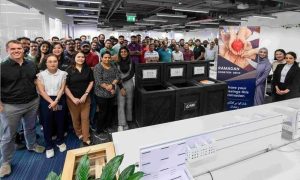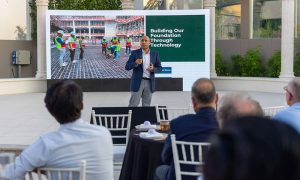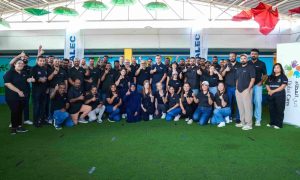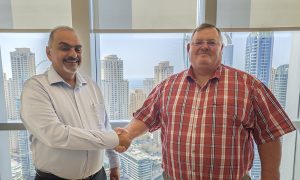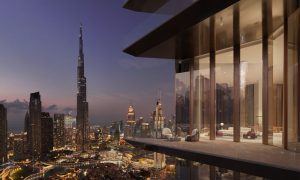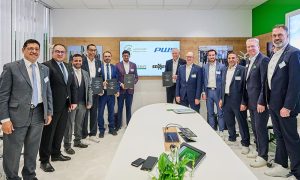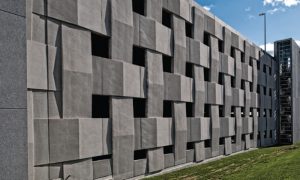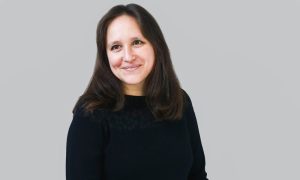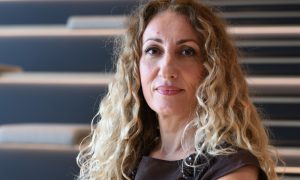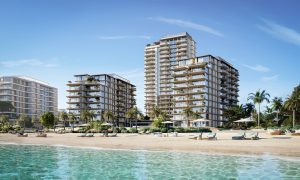ALEC chief exec Kez Taylor on why collaboration is key
Working together is key to a healthy GCC construction industry, says Taylor

Collaboration. For many a contractor in the GCC, that word represents something of a utopian dream. Look around the thousands of construction sites across the region, and you’ll be able to find project director after project director more than happy to tell you just why achieving it is so difficult. The list goes on and on – a lack of communication, unreasonable demands and deadlines, a failure in the supply chain, a misunderstanding of orders – all contributing to an overwhelming sense of fighting against a rising tide.
Given the general sense of frustration that permeates the industry when it comes to achieving collaboration, it’s understandable that contractors, especially main contractors who oversee vast megaprojects, are starting to take their own steps to ensure that their projects at least achieve some semblance of collaboration and coordination.
One of the contractors leading the charge is the Dubai-based construction giant, Al Jaber LEGT Engineering and Contracting (ALEC). As a contractor, the company has been involved with some of the UAE’s most famous landmarks, including the Dubai and Abu Dhabi International Airports, Dubai Festival City and the Mirdif City Centre and Dubai Marina malls. Therefore, it’s safe to say that it knows a thing or two about what it takes to collaborate on a major project.
“I think that one of the challenges in construction is that there are many players. You’ve got a lot of consultants, subcontractors and main contractors. The challenge is how you get them to work together effectively,” says Kez Taylor, the long-serving CEO of ALEC, during a one-on-one interview with Big Project ME at the builder’s offices in Marina Plaza.
“You’re only as strong as your weakest link, and so for us, as a main contractor, if we’re not pulling the job together effectively, or if the design isn’t in place, then no one succeeds. It doesn’t matter how good a contractor you are, you can’t really go out and execute the work. That’s the challenge – how you get everyone to do their side of the job effectively, so that everyone succeeds at the end of the day. That’s the challenge in the industry, and I still think that, in the industry, the whole chain is affected.”
With mature clients in the market also beginning to realise the value of having the right teams in place, the spotlight really is now on making sure that collaboration is achieved. To do so, Taylor says that it’s vital that the right teams also have the right individuals in place.
Having the right individuals on their projects has played a large part in ALEC’s success over the years. With an order book that currently stands at $1.41 billion, Taylor points out that it’s crucial to have staff and team leaders that can make the right decisions and actually contribute towards the vision of the company.
“You’ve got to be very selective up front, you’ve got to look at individuals very closely. What you’ve got to guard against in this market are what we call the mercenary types. The guy that moves from job to job and doesn’t complete anything, and is just chasing a quick buck. That’s not a long-term approach, and I don’t think it’s good for the individual or the company. We try to avoid those kinds of people as much as possible,” he emphasises.
“Those people who are just in it for the money, I would say that they won’t really fit in [at ALEC]. Of course, you’ve got to compensate people well and reward success, and you’ve got to give people opportunities and challenge them, but you’ve also got to be very selective. The people that you bring in from the market, you’ve got to make sure that they’re going to be a good cultural fit, and that they’ve got the right attitude to fit into your business.”
Rather than go down the recruitment route, Kez Taylor explains that ALEC prefers to develop people from within and that this is one of the challenges that the company, as a leader in the industry, needs to take on.
While it may be tempting to take the easier solution and just bring in external talent, doing so would be a betrayal of the ideals of the company. As a certain French, Premier League-winning football manager is fond of saying, the answer lies in internal solutions.
“We’ve got to challenge people and give them opportunities. If you get that set up right, then the right kind of people have the right kind of qualities. Often, the qualities that you look for aren’t necessarily the things that you’re taught, and we focus on that. We do a lot of our people development internally, and that’s been working for us.
“Our training is done internally, it’s presented by leaders in the business, and then we’ve got various modules that we go through – leadership is one such module, commercial management is a module, alignment with the business is another, and business ethics as well.
“We’ve got a whole lot of modules that we do, and I think we get a double benefit out of it, as it allows for a very good interaction between ALEC’s leadership and the people. It transfers knowledge both ways, and for us, it’s been a great platform,” Taylor says, adding that he feels that it’s really important for leadership to spend time with its people. Bringing in an outside facilitator or trainer creates a disconnect between the two, which can only hinder the spirit of collaboration and coordination being fostered.
That thought process led to Taylor and the rest of ALEC’s senior leadership team working with international consultant WSP | Parsons Brinckerhoff to put together a recent workshop for both companies’ graduates, one of the first of its kind in the UAE construction industry.
“What we said was: ‘How do we get closer together?’ WSP | Parsons Brinckerhoff are also progressive in their mind-set, and I think that we’ve got to figure out, between consultant and contractor, how we gel a lot better. At the moment, the industry doesn’t work as well together, as it should be. People aren’t clear on their roles and their responsibilities.
“Take the issue of design and shop drawings, that’s a good example. It’s not clear as to where that responsibility starts and ends, and it gets interpreted in different ways, by different people. The industry needs to figure out roles and responsibilities more clearly between key players and stakeholders on a job. Once they figure out how they work better together, they’ll end up winning,” he asserts.
Winning is something ALEC is well-versed in. The company has an annual turnover of $952.91 million, with subsidiaries contributing significantly. ALEMCO, the MEP division, contributes $136 million in annual turnover by itself.
The success of the subsidiaries has led Taylor and his leadership team to be more open about exploring new avenues and opportunities in the market. That’s why the company launched ALEC Energy this year, a new division that focuses on Dubai’s nascent renewable energy sector through the development and installation of rooftop solar power systems.
“We’re very excited about ALEC Energy. The playing field in terms of rooftop solar is going to change rapidly. The big change is that you can actually provide power back into the grid. We’re starting with our facility in Dubai Industrial City, and we’re putting on a rooftop solar setup there, We’re also putting up a control centre as well, which will monitor energy consumption. We’re setting that up on the 28th floor of Marina Plaza, where our headquarters are.
“Then we’ve got ALEMCO and we’ve got Smart4Power, which looks at energy efficiency on existing buildings. Look at where the market trends are going. We believe that rooftop solar is where it’s going to be.
“It’s almost a natural fit. We’re a contractor, we’ve got ALEMCO, Smart4Power, and now we’re setting up on the renewables side. For a construction company, one of the challenges is that it’s quite a cyclical business, so one of the things that you’ve got to look for is annuity incomes, and in rooftop solar, we believe that it’s got the potential to become an annuity income stream.”
Given that the Dubai construction sector continues to be in rude health, attention obviously turns to other markets on the Arabian Gulf peninsula. Qatar is one market that ALEC is actively involved in. Having made fine progress on their Doha International Airport project, Taylor says that the contractor is now firmly focused on their massive Doha Festival City project.
“We’re working on a fantastic project in Qatar, at 530,000sqm, it’s a massive shopping centre and we’re working with a very good team. There’s a lot of synergy between client, consultant and contractor. Everyone is pulling in the right direction, and in terms of the structure, the guys are doing a fantastic job.
“As far as that project goes, it’s got real momentum, which is a good thing to see. Projects that have momentum, things tend to happen almost effortlessly. But when it comes to Qatar, we’re selective about the projects that we do. It’s not like we go to Qatar and want do everything. We want to select the right projects and clients that are well suited to us,” he says.
While the company’s Qatar operations will continue to focus on traditional core strengths – airports, shopping centres and hotels – Kez Taylor says that for him, the Dubai market remains the most intriguing in the region, and an agreement with Iran over the lifting of sanctions could have a major positive impact on the market.
“They’re so close, and there are historical ties between them. I think the sanctions being dropped in Iran, it’s going to have a positive impact. There’s a lot of liquidity in that market that’s going to be able to be invested in certain regions.
“Dubai is a tax-free environment, and the kinds of returns you get here are probably higher than what you’re going to get anywhere else. And it’s still a growing market. In the UAE, the population grows at about 100,000 a year, and with that positive population growth comes the demand.”
For Taylor, the continued growth of the economy and the population is crucial to the emirate continuing to be a good place to invest. In a cyclical manner, their growth ties into the government’s continued desire to invest in the city’s infrastructure and development, which in turn feeds the rise of the construction industry.
“I went to Cityscape this year and had a look at the Dubai Canal project. That’s a massive undertaking, and they’re building a bridge over an existing highway, while linking in and creating all those boulevards and retail outlets. They’re also creating a peninsula that goes out into the sea, with beaches and all the rest. It’s really going to be an amazing project!
“All these types of projects are positives, and when you create a city as desirable as this, then people will want to set up here. You’re connected to anywhere in the world, you’ve got a fantastic infrastructure, healthcare is getting better and education is too. There are business opportunities available, there are challenges. It’s a very desirable place to work in comparison to a lot of other places.”
And that brings him back to where he began the interview, with the concept of collaboration. By positioning ALEC to focus on assisting their clients with the delivery of challenging mega projects, Taylor believes his company is set to go from strength to strength for years to come.
“By having an integrated approach, we can come up with renewable energy solutions, MEP solutions, interior fit-out solutions and other construction solutions as well. I think we’ve come up with an integrated approach to megaprojects, or just projects in general,” he emphasises.
“The biggest challenge in the industry is also where I see the biggest opportunity. How do you get teams to work effectively together? For me, if you can figure that out, then the value to be had by everyone is huge!
“For me, that’s the key thing, if we can get those things right, then we’ll make a quantum leap forwards in terms of the industry.”
